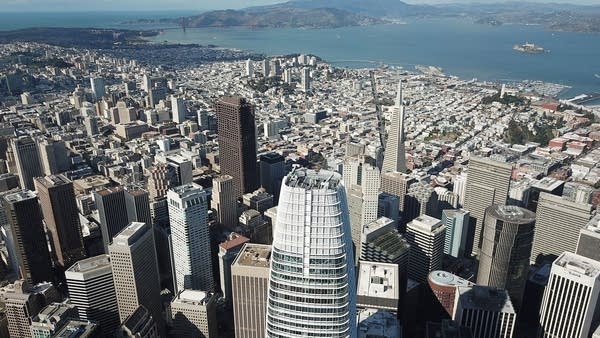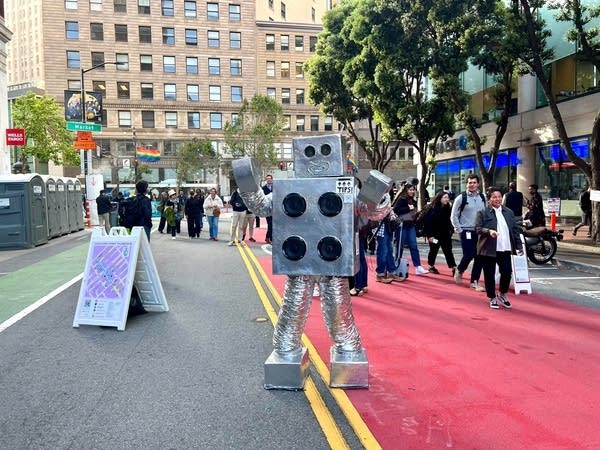The exodus of tech workers during the pandemic left the district lifeless. Now, community leaders are trying to bring people back with or without Big Tech and urging diversification of the city’s economy.

Yesterday, we explained San Francisco’s fraught relationship with the tech industry. Tech workers weren’t always welcome in the eyes of many other residents, and some were accused of changing the city’s character for the worse.
Then, when the COVID-19 pandemic began, a lot of them left, taking their dollars with them.
But on a recent Thursday evening, organizers of a block party downtown were trying to bring people back. And people showed up. The street was lined with humanity — even parents with strollers — hanging out, ordering from food trucks, dancing. Someone in a robot costume made the rounds.
“During the pandemic, everybody is working remotely,” said Natalie Mai, a tech worker who attended the block party. “It’s really great to see the people coming back.”
This year, longtime residents Manny Yekutiel, executive director of the Civic Joy Fund, and Katy Birnbaum, founder and CEO of Into the Streets, started a monthly event called Downtown First Thursdays to help revive the area.
Marketplace’s Lily Jamali spoke to Yekutiel and Birnbaum as they greeted festivalgoers. They said the event turned out just the way they’d hoped.
The following is an edited transcript of their conversation.
Manny Yekutiel: We are in a once-in-a-month kind of experience. An electric, energetic joy spiral on a street that normally is for cars and bikes, but now it’s food, it’s retail, it’s face painting, it’s mini-golf. People are dancing to salsa. It’s joy. And we’re doing this as an act of civic engagement as well. So we’ve chosen to put this here, not just because we want to have a good time, which we love to do, but because we are bringing people from all over the city, all over the [Bay Area], to reexperience our downtown and remember how great it is.
Lily Jamali: “Remember how great it is.” So it’s like you’re solving a problem. What is that problem?
Yekutiel: So, I own a coffee shop, and what I learned in my first job in coffee is a majority of your customers are regulars. They come every day, they get their cup of coffee and it becomes part of their ritual. And if you disrupt that ritual, it becomes very, very hard for you to earn new customers. It’s been sleepy downtown since the pandemic, and so we’re trying to reengage people with this area so they can remember that this is a place to go to.
Jamali: So this is one of the tech hubs in the city. Are those people, those tech workers, coming back?
Katy Birnbaum: There’s been a lot of concerted efforts, but it’s been hard. We’ve seen that it hasn’t necessarily had an uptick, but we’ve gotten incredible traction with Downtown First Thursdays and a lot of the companies really leaning in and their employees wanting to come out, wanting to have a happy hour and deciding to come to the office so that they have a reason to go to the happy hour after the office day. So, I think this is really changing and it’s going to accelerate the return to office by having there be fun, cool things to do when they come into the city.

Jamali: And Manny, that’s what you as a business owner need, right? You need those tech workers to come back into the city?
Yekutiel: Well, I think our city needs to diversify its economy, and I think one thing we learned from the pandemic is we really can’t and shouldn’t as a city rely on one industry to fulfill our tax obligations and to power our city’s economy. And so what I hope comes out of this is obviously more office workers of all stripes, but also an understanding that our downtown is a neighborhood, and we need to nurture that neighborhood and have more housing, have more community events like this. Employees need to be given a reason to come to the office, and features like this will help with that.
Jamali: As much as you want to diversify the economy right now, most of the people I’m pulling aside here today do work in one industry, and that industry is tech. That’s who you have right now.
Yekutiel: Yeah, but we are, the city is at a pivot point, right? We’re reimagining, we’re asking the question of who San Francisco wants to be. And I do not believe that any city is healthy when it relies so heavily on one industry. So I’m glad that there are tech folks here. I love my tech folks. And we should have clean energy, and we should have education, and we should have hospitals, and we should have nurses, and we should have finance, and we should have emerging industries too. So to me, it’s like, I want to see the next 50 years — San Francisco punches above its weight. We have just as good of a music scene as New York or L.A., just as good of a theater scene, a better food scene than a lot of other major cities. We have incredible nightlife, incredible culture, the best gay scene in America. We should also excel not just in tech, but in every industry, because we can, and so that’s what I want to see.
Jamali: Do you agree with that, that the city needs to look beyond tech a little bit as a focal point of what the economy revolves around?
Birnbaum: Yes, I do agree. I mean, part of the reason why I started Into the Streets was to help San Francisco focus on arts and culture and community as part of its economic revitalization strategy and bringing spaces like this to the forefront, where we are actually directly supporting some of the most creative people here in the city. That’s musicians, that’s artists. So, we’re not only creating this celebration and this experience, we’re also allowing there to be a whole artistic class that actually can live still and still be here in the city. So I do think it’s really, really important to diversify it. And like Manny said, it takes everybody. It’s not that we want to replace tech with something else. We want tech folks to be here celebrating with everybody and it to be a very, very diverse both economy and community.
Jamali: Last thing. Is there a little bit of a sense of resentment about the role that tech played in the city this past decade, and now there’s sort of an opportunity for a reset?
Yekutiel: There was resentment towards technology before the pandemic. My resentment was it was just really hard to get a reservation at a restaurant, honestly.
Jamali: Times are tough, man.
Yekutiel: And it’s easier to get a reservation now. No, I mean, it’s interesting. I moved here in 2012 and so I saw the boom really boom. Is there a resentment now? I think a lot less so. I think we have a lot of retail vacancies. We have a lot of empty offices. San Francisco is selling itself again. But also, what made San Francisco amazing has not changed. So I don’t feel like, I don’t think we need tech to be a great city. And that wasn’t the case before the pandemic, that isn’t the case now. San Francisco is a great city because of the people that are here, the culture that’s here because of things like this, and not about who’s making money or how they’re making it. And that fundamental hasn’t changed, and it is my hope that it won’t change at all. So I welcome tech, I welcome everyone. But what’s most important to me is the kind of crucible stone of San Francisco, which is our culture.